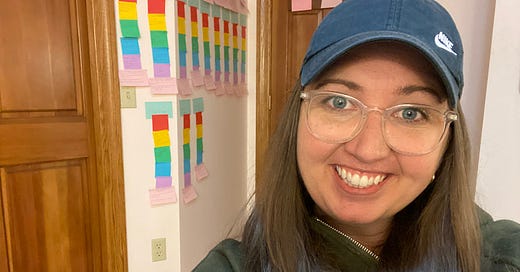I recently did a Q&A for my book, Audacious: Redefining the Space between a Bold Request and an Unimaginable Answer.
One of the final questions of the session was about my favorite part of the book writing process. My answer was easy —
The outline - a color-coded structure of post-it notes stuck to my bedroom wall.
Prior to this physical outline, the idea of a book lived rent free in both my mind and a very chaotic google doc. Every few months I would spend a morning at a coffee shop or cozied up at my desk to brain dump the stories, paradigm shifts, and Holy Spirit convictions that I was living out in real time. I could feel in my bones that I was identifying the pieces of a book but I wasn’t sure exactly how it all fit together.
It was nearly a decade prior to this that I had said out loud for the first time: I’d like to write a book one day. So to be even flirting with the idea of finally doing it was equally energizing and daunting.
As I played Tetris with the words and ideas in my brain dropping onto a blank page … doubts crept into my mind —
Do the stories and ideas I’m weaving together even make sense? Am I crazy for thinking that I could write a book? Is this story - whatever it is - even worth telling?
The questions kept me thinking about writing a book, without actually committing to it… and I had a hard time committing because I didn’t know where begin with chasing a dream like this.
You see, I am someone who loves a plan.
I read the entire instruction manual before putting together a new bookshelf. I pull up directions to my destination even when I know exactly how to get there. I look up the menu before going to a new restaurant so I’m not caught off guard when it comes time to order. The phrase “go with the flow” rarely comes without a few clear parameters. I like to know where to start, where I’m going, and all the steps in between.
Writing this book was something I knew I needed to do, but I was waiting for a fool-proof plan on how to get there.
If you’re like me, we can get stuck in analysis paralysis - not being able to make a decisions because we’re over analyzing the problem.
My least favorite piece of advice for this is: Just Start! My knee-jerk defensive response is always: But, where!?
I’ve learned that “just starting” is not necessarily taking a physical action but asking the right questions.
Questions like:
What do I need to know before I begin? Or where have I already begun?
Consider the facts of the situation and what kind of information is missing. I know that I am a Context Queen - wanting to know the who, what, where, when, why, and how before I dive in.
Acknowledge where you’ve already taken action, even if it doesn’t feel like it. Starting small is still starting.
What resources are available to me?
Think of friends, networking connections, books, podcasts… Analysis paralysis can often tell us that we are alone in the problem so taking a moment to look outward can help us see resources that are already available.
What will be the biggest obstacle ahead of me?
Name it and give yourself permission that you don’t need to resolve it right now. You can anticipate the challenge and prepare, but overcoming it before it even arrives doesn’t need to be a part of getting started.
It was through my analysis paralysis of how to start writing the book that I (re)learned the beauty of just getting started and seeing how things unfold along the way.
Creating the post-it note outline of my book was my favorite part because it was the first time that the dream in my heart became a physical reality. I could hold it in my hands, move chapters around, and see it all in one place without endless scrolling. It showed me that the pieces I was fitting together in my brain all those years really did make sense.
But the final table of context didn’t align perfectly with the post-it notes that I kept on my wall for way too long after the publish date. The book had evolved between the various stages of the writing process and the real-time story I was living out.
If I had waited for a fully fleshed out plan and not waivered from it, I’m not sure I would have met this goal of mine.
Wanting a plan is good - it’s a good thing to operate with structure and seeking clarity amidst uncertainty. But when we focus on having a plan more than getting started on a goal, it can hold us back from chasing a dream.





